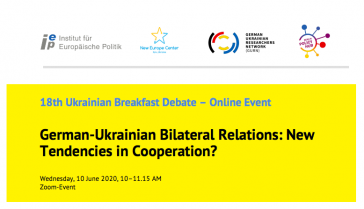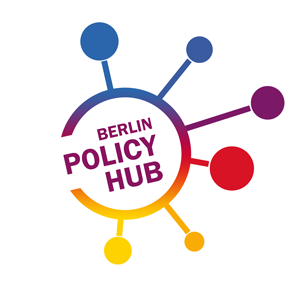18th Ukraine Breakfast Debate: „German-Ukrainian Bilateral Relations: New Tendencies in Cooperation?”

What is the status quo of German-Ukrainian bilateral relations and what changes occurred during the first year of Volodymyr Zelensky’s presidency? How should these relations be shaped in the future to meet the expectations of both sides? These questions were at the core of the 18th Ukraine Breakfast Debate on the topic „German-Ukrainian Bilateral Relations: New Tendencies in Cooperation?” that took place on 10 June 2020 in Berlin. For the first time, the Ukraine Breakfast Debate was held online, highlighting the importance of a constant exchange on current developments in the German-Ukrainian context.
This time, the presentations and discussions were based on a policy paper that originated from the cooperation between the Institut für Europäische Politik (IEP, Berlin) and the New Europe Center (NEC, Kyiv) and that was supported by the Open Society Foundations in the framework of the project „Europeanization beyond Process“. The paper was co-authored by Dr. Susan Stewart of the German Institute for International and Security Affairs (SWP), Ljudmyla Melnyk of the Institut für Europäische Politik (IEP, Berlin) and senior project manager of GURN, and Alyona Getmanchuk and Sergiy Solodkyy from the New Europe Center (NEC, Kyiv). As a basis for the study, the co-authors conducted interviews with high-level representatives of the political and societal sphere in Germany and Ukraine in February and March 2020. The policy paper’s publication as well as the breakfast debate received kind support by the Berlin Policy Hub.
After Dr. Katrin Böttger, director at IEP, welcomed the participants of the breakfast debate, Alyona Getmanchuk (NEC) went on with outlining the political priorities and expectations of the Ukrainian side from the bilateral relations. What is Ukraine looking for in its German partner? Regarding the political priorities of the Ukrainian side, the interviewers found that the foreign policy approach under Zelenskyy shifted focus from searching for a political ally to mainly trying to attract foreign direct investments. Finding a solution for the armed conflict in Donbas remains on top of the agenda on both sides. Dr. Susan Stewart (SWP, Berlin) further illustrated the German perspective: As for the German side, the Ukrainian reform process is perceived to be the most important issue. In this regard, Zelenskyy’s approach to focus on the attraction of investors is viewed with scepticism – this approach could turn out unsuccessful if the Ukrainian government would stall further reforms to strengthen the rule of law. Slow progress in reforming the country is viewed to be an even more serious obstacle to investment than the war in Donbass, as Ljudmyla Melnyk (IEP, Berlin) additionally notes.
According to Sergiy Solodkyy (NEC, Kyjiw), the set of expectations towards Germany includes the support for implementation of prisoner exchanges as well as for the Agreement on Conformity Assessment and Acceptance of Industrial Products (ACAA). The fact that the German side puts special emphasis on the reform process does not constitute an obstacle to the German-Ukrainian relations, as Dr. Susan Stewart (SWP, Berlin) pointed out. She highlighted that the conjunction of reforms and investments – rather than opposing these two – is key to the future relations between Ukraine and Germany.
Another important finding of the study is that the German side wishes for a more institutionalized form of communication between the two countries while Ukraine attaches more importance to a personal touch in communications. Due to this difference, perceptions of success or failure also differ when it comes to assessing the bilateral communication. Furthermore, a lack of communication between individual Ukrainian government ministries is perceived to hinder successful cooperation.
During the breakfast debate, Ljudmyla Melnyk (IEP, Berlin) pointed to one interviewee’s suggestion that this obstacle could be overcome by reviving an annual, high-level communication format that had been established under former Ukrainian president Leonid Kuchma and Gerhard Schröder years ago.
In sum, Ukrainian-German relations remain an important, strategic foreign policy component for both countries, regardless of the differences in priorities and expectations that have been expressed by the interviewees. The continuous exchange on various levels, among others the good relationship between the two foreign ministers, Dmytro Kuleba and Heiko Maas, underlines this reasoning.
The Ukraine Breakfast Debate series is part of the project “German Ukrainian Researchers Network” (GURN). GURN aims at establishing a German-Ukrainian network for senior and junior researchers and their organizations, strengthening country expertise and promoting joint cooperation projects. GURN is conducted in close cooperation with the Ilko Kucheriv Democratic Initiatives Foundation (DIF, Kyiv), the think tank development and research initiative „think twice UA” (Kyiv), the New Europe Center (NEC, Kyiv) and is kindly supported by the Federal Foreign Office.
The Berlin Policy Hub is part of the “Europeanization beyond process” initiative supported by the Open Society Foundations and aims to intensify exchanges between Eastern European think tanks and their German counterparts and to facilitate new forms of cooperation. The project gives researchers from Georgia, Moldova and the Ukraine the opportunity to present their expertise and research results to a German audience, while at the same time gaining a better understanding of the discourse within Germany on these topics.
The policy paper „Priorities and Expectations from Ukraine and Germany: How to make bilateral relations more sustainable?“ is accessible here.





